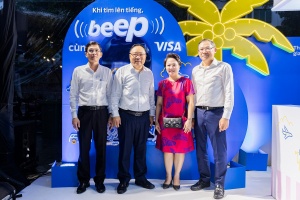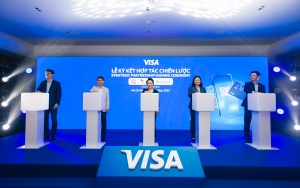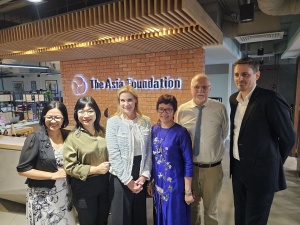“Middlescents” or Gen X spending outpacing other generations
 |
Despite their size and spending power, a large proportion of middlescents remain overlooked and underserved, revealing a largely untapped market for many brands.
The research reveals that in Vietnam, 84 per cent of middlescents are likely to spend money to pursue their personal hobbies and interests, slightly higher than the Asia Pacific average of 82 per cent. Meanwhile, 80 per cent of Vietnamese respondents plan to increase spending on out-of-home leisure activities in the next 12 months. Additionally, 47 per cent are planning to treat themselves to a well-deserved holiday, while 58 per cent are likely to invest in premium products and services.
Dung Dang, Visa country manager for Vietnam and Laos, shared, "Middlescents represent a largely untapped consumer market for numerous businesses. With distinct consumer needs and substantial purchasing power, they are a formidable target audience that can be strategically catered to. Their expectations include a digital payments journey that is intuitively customised, seamless, and secure. Although they are influenced by the younger generations' embrace of digital payments, middlescents also have the capacity to guide and inspire these younger cohorts in their own unique ways. With Visa's data-driven insights, brands have the opportunity to develop a strategic approach that both acknowledges and empowers middlescents."
While the term middlescence was coined six years ago, the unique needs of this group have only been addressed more prominently recently. As individuals from Gen X transition into middle age, they experience significant changes in health, career, and family dynamics – a phenomenon reminiscent of a second adolescence. This critical stage is marked by a renewed focus on personal interests that were previously sidelined due to professional and family commitments. They now utilise their additional personal time to explore their identities and plan travel experiences tailored to their and their loved ones' tastes.
These individuals are seeing a surge in personal time, which can be used for self-exploration. The middlescence period is marked by the discovery of personal interests and sources of satisfaction. When considering their travel and hobbies, middlescents seek unique experiences that factor in their individuality and authenticity as they gain more “me” time, using AI and technology to simplify their travel planning, and seizing opportunities arising from the increasing affordability and simplification of travel.
Many are also comfortable spending a lot of time in an immersive, digitally generated world, with 51 per cent of Vietnamese respondents stating so, and 49 per cent have expressed interest in using virtual /augmented reality to shop for products. This presents numerous opportunities for merchants to meet evolving customer demands in the digital commerce and payments space.
The current digitalisation trend is experiencing robust growth, leading to evolving consumer needs and development across all ages and locations. As part of the 2024 "Cashless Day" campaign, aimed at raising awareness and enhancing experiences for all audiences, Visa is offering numerous incentives targeting specific groups such as the middlescents across various sectors, including travel, entertainment, lifestyle, and consumer goods. Visa's research and promotional efforts act as a bridge to help brands better reach customers, especially the middlescents, thereby fostering overall economic growth.
 | Visa supports Cashless Day 2024, accelerating Vietnam's digital payments revolution Visa is continuing to support Vietnam's annual Cashless Day (June 16), aiming to propel the country's digital payment ecosystem. |
 | Visa partners with Vietnamese e-wallet apps Visa has announced a new partnership with three of the most popular e-wallets in Vietnam – MoMo, VNPAY and ZaloPay – to provide a more convenient payment experience for cardholders at participating small- and medium-sized enterprises (SMEs). |
 | Visa supports female and youth-led businesses in Southeast Asia A report by the Organisation for Economic Co-operation and Development found that rural communities, women, and certain ethnic minority groups face barriers to realising the full uptake of digital options. Many frequently encounter growth hurdles due to cultural and institutional obstacles, coupled with a preference for informal financing. |
What the stars mean:
★ Poor ★ ★ Promising ★★★ Good ★★★★ Very good ★★★★★ Exceptional
 Tag:
Tag:
Related Contents
Latest News
More News
- VIB named Best Customer Satisfaction Bank in Vietnam 2025 (December 26, 2025 | 16:40)
- Visa and Techcombank win AmCham’s 2025 ESG Tech Innovation Award for Eco Card (December 09, 2025 | 12:16)
- Visa brings tap-to-ride payments to Hanoi Metro Line 2A (December 05, 2025 | 17:35)
- Cross-border QR payments launched for Chinese tourists (December 03, 2025 | 19:12)
- VIB honoured by JP Morgan with 2025 US Dollar Clearing Elite Quality Recognition Award (December 02, 2025 | 17:04)
- Home Credit Vietnam brings financial literacy closer to women and students (November 20, 2025 | 11:25)
- MB partners with Visa, KOTRA to launch new MB Visa Hi BIZ card (November 20, 2025 | 11:24)
- VPBank upgrades core banking with Temenos and Systems Limited (November 14, 2025 | 17:54)
- CPO Home Credit shares how to build an AI-driven but human-centric workplace (October 30, 2025 | 09:56)
- VIB hits $267.4 million in pre-tax profit over first nine months (October 29, 2025 | 12:12)





















 Mobile Version
Mobile Version